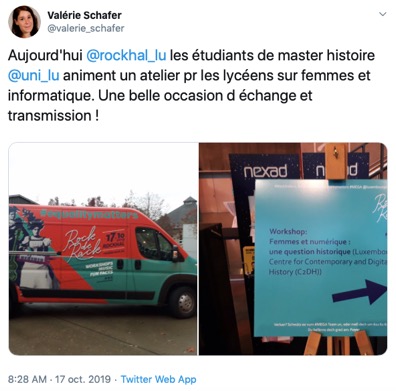On 17 October 2019, the Ministry of Equality between Women and Men organised the “Rock de Rack” festival at the Rockhal to celebrate the centennial of women’s right to vote in Luxembourg (see programme). The event consisted of educational workshops centred around gender equality and aimed at high-school students.
This turned out to be the perfect opportunity for the second-year students of the masters in Contemporary European History (MAHEC) to share the work they had done in their ‘Women and ICTs: an historical analysis’ research seminar. Under the supervision of prof. Valérie Schafer and Sytze van Herck, we put together two 90-minute interactive sessions where we addressed the historical issues related to the current gender gap in ICT-related fields by contextualising within the wider history of computer technologies.
As such, in our introductory presentation we showed that this history was heavily marked by the presence of female pioneers such as the ENIAC Girls or the human computers of NASA – a presence which nevertheless started to decline in the 80s, with the advent of geek culture and the image of the male programmer. This presentation was followed by three ten-minute presentations on the ENIAC Girls, Katherine Johnson and Frances Allen, aimed to familiarise the students with some of the forgotten or hidden pioneers of computer science. To make things more interactive and test their knowledge, we then asked the students to do a short quiz on their mobile phone, followed by presentations on two historical sources in order to bring to their attention to the sexist clichés present in advertising.
Our goal was to encourage the students to reflect on the history of computer science by shedding a light on women’s contributions to the field, and to encourage them to think critically and deconstruct the gender stereotypes that are prevalent in the media. We believe we have achieved this goal, as we were lucky enough to have a lively, proactive audience: the students actively engaged in the debates and demonstrated an awareness of the issue of gender inequality and the impact it has on society. Perhaps more importantly, they genuinely seemed to enjoy our presentations.
Written by
Iona Turdean (MAHEC)

